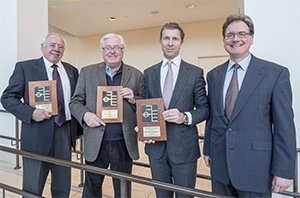The editors of Professional Mariner have presented the 2016 Samuel Plimsoll Awards for Outstanding Service to a Columbia River Bar pilot who pioneered vessel transfer safety improvements and breakthroughs in mariner fatigue management, and to a tug and barge company that established an incentive system for better safety habits.
The 2016 Plimsoll Award for Innovation went to a company that has developed an air-lubrication system that can save fuel and reduce emissions.
The editors this year honored Capt. Gary Lewin of the Columbia River Bar Pilots for outstanding service by an individual. Lewin most notably worked to bring helicopter boarding to the treacherous crossing, played a leadership role in identifying the safest self-righting fast-run boat for the waterway and creatively modified work schedules to battle pilot fatigue.
Lewin’s nomination stated that he “exemplifies progressive thinking in the piloting realm” and “had an early vision of moving beyond traditional pilot boarding.”
Lewin brought in an expert on astronaut fatigue — who had advised the National Aeronautics and Space Administration — in an effort to identify novel ways to reduce the safety risk associated with bar pilots’ sleep and rest challenges in their around-the-clock profession. The result was a fatigue education program and more consistent scheduling.
“His most notable accomplishment is the adoption of helicopter boarding in the hazardous entrance to the Columbia River Bar,” said his colleagues in their nomination letter.
“Instead of boarding close to the entrance, often with a large course change to make a lee, a pilot could board miles (out) at sea and have time and sea room to do a master-pilot exchange and get the ship lined up with other traffic before entering the confines of the river,” they wrote. “These ideas represented a quantum leap in improving safety.”
Harley Marine Services received the award for outstanding service by an organization. The Seattle-based tug and barge company distinguished itself by virtue of its creative incentive framework that encourages mariners to embrace good safety habits and to speak out if they believe improvements can be made. Harley Marine also showed leadership in Washington state’s Worst Spill Drill, in which the company offered its high-tech facilities to the practice effort.
Harley’s Safety Incentive Program (SIP) awards points to crewmembers when they come forward with safety tips, submit safety articles, file near-miss reports, participate in regular safety meetings or conduct job-safety analyses. They receive additional points if there are no vessel incidents over a period of three months. The crewmembers then can redeem their points to “purchase” various goods.
“Through careful consideration and a comprehensive approach, the SIP program increases safety and accountability,” the nomination stated.
Additionally, Harley Marine “has placed itself in the vanguard of spill prevention and training,” the letter said. The company hosted Washington’s 2014 drill at its headquarters and offered the use of its media wall with 12 LCD monitors. Enhanced vessel tracking management, camera feeds and a blend of AIS and operation data improved the coordinated response.
“The wall’s ability to receive information from multiple sources, and then present it in a unified and comprehensive manner, empowers dispatchers to make more informed real-time decisions,” the nomination said.
This year’s winner of the award for innovation is Silverstream Technologies, the developer of an air-lubrication system for ship hulls.
Sometimes referred to as the equivalent of a maritime “magic carpet ride,” the simple act of creating a thin layer of bubbles underneath a hull can reduce hydrodynamic drag. The result is a significant fuel savings and reduced emissions of pollutants, and it gives the operator the option of increasing speed.
The Silverstream system underwent landmark sea trials in 2015 on the 40,000-dwt ship MT Amalienborg, in both ballast and laden conditions. The air lubrication technology offered efficiency gains of at least 5 percent. The installation also proved that the system can be retrofitted.
Silverstream’s air lubrication system will be included on the Norwegian Cruise Lines (NCL) vessel Norwegian Bliss when the ship is delivered in 2017. Notwithstanding cheaper fuel prices in recent years, the cruise line noted that sailing in Emission Control Areas remains costly.
“It is therefore critical that we look at viable opportunities that improve operational and environmental efficiencies, driving down fuel bills and reducing emissions,” said Christer Karlsson, NCL’s senior vice president for newbuilding. “The Silverstream system is an example of such a clean technology that can genuinely make a difference.”
The Plimsoll Awards were presented March 22 at the Connecticut Maritime Association’s Shipping 2016 Conference in Stamford, Conn.

